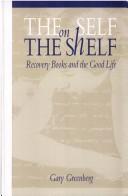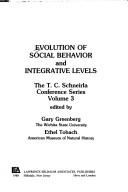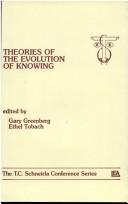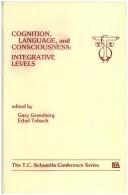| Listing 1 - 10 of 16 | << page >> |
Sort by
|

ISBN: 0585044880 9780585044880 0791420450 0791420469 1438404751 9781438404752 Year: 1994 Publisher: [Place of publication not identified] State University of New York Press
Abstract | Keywords | Export | Availability | Bookmark
 Loading...
Loading...Choose an application
- Reference Manager
- EndNote
- RefWorks (Direct export to RefWorks)
Codependency literature --- Interpersonal relations --- Autonomy (Psychology) --- Conduct of life --- Codependency, Psychological. --- Ethics. --- Interpersonal Relations. --- Self-Assessment. --- Ethics, Practical --- Morals --- Personal conduct --- Ethics --- Philosophical counseling --- Freedom (Psychology) --- Independence (Psychology) --- Self-determination (Psychology) --- Self-direction (Psychology) --- Dependency (Psychology) --- Ego (Psychology) --- Emotions --- Mental health literature --- Codependency --- Assessment, Self --- Self-Criticism --- Self Assessment --- Self Assessment (Psychology) --- Assessment, Self (Psychology) --- Assessments, Self --- Assessments, Self (Psychology) --- Self Assessments --- Self Assessments (Psychology) --- Self Criticism --- Self-Assessments --- Self-Criticisms --- Metacognition --- Gender Issues --- Husband-Wife Communication --- Partner Communication --- Social Relationships --- Communication, Husband-Wife --- Communication, Partner --- Communications, Husband-Wife --- Communications, Partner --- Husband Wife Communication --- Husband-Wife Communications --- Interpersonal Relation --- Partner Communications --- Relation, Interpersonal --- Relations, Interpersonal --- Relationship, Social --- Relationships, Social --- Social Relationship --- Social Behavior --- Friends --- Emotional Intelligence --- Egoism --- Ethical Issues --- Metaethics --- Moral Policy --- Natural Law --- Situational Ethics --- Ethical Issue --- Ethics, Situational --- Issue, Ethical --- Issues, Ethical --- Law, Natural --- Laws, Natural --- Moral Policies --- Natural Laws --- Policies, Moral --- Policy, Moral --- Censorship, Research --- Co Dependence, Psychology --- Co Dependency, Psychology --- Co-Dependency, Psychological --- Co-Dependency, Psychology --- Codependence --- Codependency, Psychology --- Psychological Co-Dependence --- Psychological Co-Dependency --- Psychological Codependence --- Psychological Codependency --- Co Dependency, Psychological --- Co-Dependence, Psychological --- Codependence, Psychological --- Psychological Co Dependence --- Psychological Co Dependency --- Psychology Co Dependence --- Psychology Co Dependency --- Psychology Co-Dependency --- Psychology Codependency --- Interpersonal Relations --- Substance-Related Disorders --- Moral and ethical aspects --- Conduct of life. --- Moral and ethical aspects.
Book
ISBN: 9781433197772 1433197774 9781433166051 9781433166020 9781433166037 9781433166044 1433166054 Year: 2020 Publisher: Berlin: Lang,
Abstract | Keywords | Export | Availability | Bookmark
 Loading...
Loading...Choose an application
- Reference Manager
- EndNote
- RefWorks (Direct export to RefWorks)
In this landmark study of the literary relationship between the gospel of John and the synoptic gospels, Gary Greenberg presents compelling evidence for the existence of a written pre-canonical Alpha gospel that contained almost all of the main episodes in the adult life of Jesus (excluding major speeches, such as discourses, parables, and "I Am" sayings) and which became the written source for the core biography of Jesus in Mark, Luke, John, and Matthew. While Mark used the Alpha gospel with only slight variations, John had profound theological disagreements with it, objecting to its theological message about how to obtain eternal life, the depiction of Jesus, and other matters. This induced him to rewrite the Alpha gospel so that it conformed to his own very different theological agenda. Consequently, John’s gospel functions as a thorough theological critique of Mark, but the changes he introduced made it difficult to see how he and Mark worked from the same written source. By using John’s theological concerns as a filter for reading and understanding what objections John would have with Mark’s Jesus stories, The Case for a Proto-Gospel reverse-engineers the editorial path taken by John and reconstructs the content of the Alpha gospel. Finally, the author discusses the relationship of the other two synoptic gospels to the Alpha gospel, asserting that Luke also knew the Alpha gospel but used Mark as his primary source, and that while Matthew did not know the Alpha gospel, his use of Mark as a primary source ensured that his core biography of Jesus also derived from this earlier source.
Book
ISBN: 9781922247056 Year: 2013 Publisher: London : Scribe,
Abstract | Keywords | Export | Availability | Bookmark
 Loading...
Loading...Choose an application
- Reference Manager
- EndNote
- RefWorks (Direct export to RefWorks)
Book
ISBN: 9781527507906 1527507904 Year: 2018 Publisher: Newcastle upon Tyne Cambridge Scholars Publisher
Abstract | Keywords | Export | Availability | Bookmark
 Loading...
Loading...Choose an application
- Reference Manager
- EndNote
- RefWorks (Direct export to RefWorks)
Book
ISBN: 1408852977 Year: 2013 Publisher: London, England : Bloomsbury,
Abstract | Keywords | Export | Availability | Bookmark
 Loading...
Loading...Choose an application
- Reference Manager
- EndNote
- RefWorks (Direct export to RefWorks)
Depression, Mental --- Antidepressants --- History. --- History.
Book
ISBN: 1922072583 Year: 2013 Publisher: New York : Scribe,
Abstract | Keywords | Export | Availability | Bookmark
 Loading...
Loading...Choose an application
- Reference Manager
- EndNote
- RefWorks (Direct export to RefWorks)
A riveting exposé of the psychiatric profession's bible from psychotherapist Gary Greenberg, revealing the deeply flawed process by which mental disorders are invented and uninvented - and how suffering has been turned into a commodity. Since its first edition in 1952, the Diagnostic and Statistical Manual of Mental Disorders (DSM) has been regarded as the leading authority on mental-health diagnosis and research. But throughout the DSM's various iterations, debate has raged over which psychological problems constitute mental illness - homosexuality, for instance, was a mental illness until
Mental illness --- Psychiatry --- Philosophy. --- Diagnostic and statistical manual of mental disorders.
Book
ISBN: 1101621109 Year: 2013 Publisher: East Rutherford : Penguin Publishing Group,
Abstract | Keywords | Export | Availability | Bookmark
 Loading...
Loading...Choose an application
- Reference Manager
- EndNote
- RefWorks (Direct export to RefWorks)
For more than two years, author and psychotherapist Gary Greenberg has embedded himself in the war that broke out over the fifth edition of the Diagnostic and Statistical Manual of Mental Disorders ( the DSM ): the American Psychiatric Association 's compendium of mental illnesses and what Greenberg calls the book of woe.Since its debut in 1952, the book has been frequently revised, and with each revision, the official view on which psychological problems constitute mental illness. Homosexuality, for instance, was a mental illness until 1973, and Asperger s gained recognition in 1994 only to see its status challenged nearly twenty years later. Each revision has created controversy, but the DSM-5, the newest iteration, has shaken psychiatry to its foundations. The APA has taken fire from patients, mental health practitioners, and former members for extending the reach of psychiatry into daily life by encouraging doctors to diagnose more illnesses and prescribe more therapies often medications whose efficacy is unknown and whose side effects are severe. Critics including Greenberg argue that the APA should not have the naming rights to psychological pain or to the hundreds of millions of dollars the organization earns, especially when even the DSM s staunchest defenders acknowledge that the disorders listed in the book are not real illnesses.Greenberg' s account of the history behind the DSM, which has grown from pamphlet-sized to encyclopedic since it was first published, and his behind-the-scenes reporting of the deeply flawed process by which the DSM-5 has been revised, is both riveting and disturbing. Anyone who has received a diagnosis of mental disorder, filed a claim with an insurer, or just wondered whether daily troubles qualify as true illness should know how the DSM turns suffering into a commodity, and the APA into its own biggest beneficiary. Invaluable and informative, The Book of Woe is bound to spark intense debate among expert and casual readers alike..
Mental Illness --- Psychiatry --- Psychology --- Medical

ISBN: 0898597234 Year: 1988 Publisher: Hillsdale, N.J. Lawrence Erlbaum
Abstract | Keywords | Export | Availability | Bookmark
 Loading...
Loading...Choose an application
- Reference Manager
- EndNote
- RefWorks (Direct export to RefWorks)

ISBN: 0805807551 Year: 1990 Publisher: Hillsdale, N.J. Lawrence Erlbaum
Abstract | Keywords | Export | Availability | Bookmark
 Loading...
Loading...Choose an application
- Reference Manager
- EndNote
- RefWorks (Direct export to RefWorks)

ISBN: 0898597226 Year: 1987 Publisher: Hillsdale (New Jersey) Erlbaum
Abstract | Keywords | Export | Availability | Bookmark
 Loading...
Loading...Choose an application
- Reference Manager
- EndNote
- RefWorks (Direct export to RefWorks)
Animal communication --- Cognition --- -Cognition in animals --- -Consciousness --- -Psycholinguistics --- -Psychology, Comparative --- -Behavior, Comparative --- Comparative behavior --- Comparative psychology --- Ethology, Comparative --- Intelligence of animals --- Zoology --- Animal behavior --- Animal intelligence --- Animal psychology --- Human behavior --- Instinct --- Language, Psychology of --- Language and languages --- Psychology of language --- Speech --- Linguistics --- Psychology --- Thought and thinking --- Apperception --- Mind and body --- Perception --- Philosophy --- Spirit --- Self --- Animal cognition --- Congresses. --- Congresses --- Psychological aspects --- Cognition in animals --- Consciousness --- Psycholinguistics --- Psychology, Comparative --- Language --- congresses. --- -Congresses.
| Listing 1 - 10 of 16 | << page >> |
Sort by
|

 Search
Search Feedback
Feedback About UniCat
About UniCat  Help
Help News
News